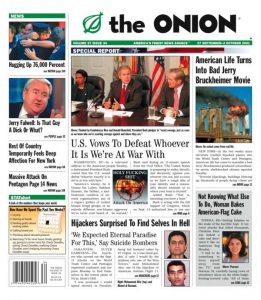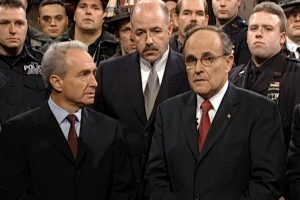Our ASTU Class’s has just read Moshin Hamid’s The Reluctant Fundamentalist, a novella told in the style of a dramatic monologue that can be described as a “coming-of-age romantic historical-fiction thriller”. In a very small nutshell, the story focuses around a young Pakistani man who lives in New York City during the September 11 attacks. The whole book, including its ending, is ambiguous and does not aid the reader in putting together any clues. Such confusion is reflective of people’s actual attitudes after the event in question.

Satirical newspaper The Onion’s first issue after the attacks
I’ll never know what 9/11 felt like, I was too young to remember. I can watch movies, read books, ask my parents, but I’ll never know how it felt for something so drastic to occur on such a normal day, and I’ll never know what it felt like to live before it happened.
It’s sad to think about, but it appears that events like 9/11 are becoming more and more . . . normal. Of course an event with so many casualties in so little time hasn’t happened since, but events like the Paris Attacks, the Belgian Airport Bombings, the shooting in the Turkish nightclub, they happen, and they shake us, but we can “move on” in a week or so, blaming the whole thing on how much the world sucks nowadays. I’ll never know what it was like to be so blissfully unaware that such a thing could happen, and then be confronted with an event so catastrophic it changed the world in such massive, unpredictable ways.
People in the entertainment industry, especially in comedy, didn’t know how to respond. It was as if people were afraid to be funny, as if the ice they were walking on could break if they took the wrong breath. The TV show Friends had to edit an episode that aired on October 11, 2001; it contained a scene where Monica and Chandler get detained at an airport because Chandler makes a joke about bombs on planes. A 1997 episode of The Simpsons called The City of New York vs. Homer Simpson, in which Homer declares his distain for the city, and features the World Trade Centre prominently, was removed from syndication. Dozens of other films and TV shows decided to remove scenes containing the towers or to digitally remove them, as if they were never there. Out of sight out of mind.

Lorne Michaels and Rudy Giuliani on SNL’s first episode back
Late night shows decided to acknowledge the event. David Letterman gave an eight minute monologue with humour that didn’t go past self-deprecation and bald jokes, with light laughter from the audience. Letterman praised then New York mayor Rudy Giuliani and New York’s firefighters, which was met with sentimental applause. On Saturday Night Live, folk-rock singer Paul Simon sang “The Boxer”, while Giuliani and show creator Lorne Michaels stood onstage with members of the NYPD and FDNY.
“Can we be funny?”, asks Michaels.
“Why start now?”, responds Giuliani, with thunderous applause and laughter from the audience.
The 53rd Emmy Awards were held on November 4th, six weeks late. American treasure Ellen Degeneres was the host. She began with some humour that was easy to handle, and addressed the elephant in the room with a joke that finally made it okay for everyone in the theatre to actually laugh again: “Think about it. What would bug the Taliban more than seeing a gay woman in a suit surrounded by Jews?”. The audience screams with laughter, people turn to their neighbours and smile. On with the show.
Regardless of our ability to live our lives without thinking of the event at every moment, it remains something that is impossible to joke about. There are a lot of devastating historical events that people feel safe making fun of, but 9/11 is not one of them. In all fairness, it is a fairly recent event, and there’s no real reason why people should make fun of it. But comics like Marc Maron walked this tightrope. In 2011 Brooke Gladstone interviewed Maron for the podcast On The Media, asking about the possibility of a “ten years later” joke. Here, Maron is referring to an instance where a women laughed at his introduction to a joke in which he almost killed two people.
“And somehow, like I built on it, to the point where I got the Holocaust involved. I said, ‘is that funny to you?’. And then people were still laughing cause I was sort of attacking this woman. And then when I said ‘9/11’ it was like ‘whoa whoa’. So I think it does still represent a tremendous pain in this country’s cultural fabric,”.
I highly recommend this podcast episode, found here: http://www.wnyc.org/story/after-911-nothing-was-funny/
Garfield, B. and Gladstone, B. “After 9/11, Nothing Was Funny.” Audio Blog Post. On The Media. WNYC. Sept. 14, 2016. Web. Jan. 26, 2017.